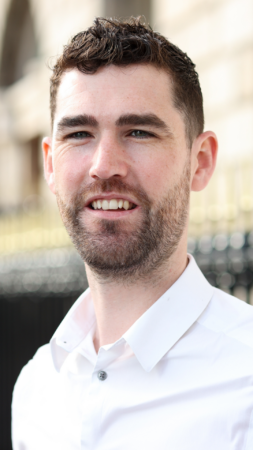22 January 2024
By Tom Collins
tom@TheCork.ie
In advance of International Epilepsy Day on the 12th of February, Epilepsy Ireland, the national patient organisation supporting people living with the condition, have appealed to local people across Cork to learn about Seizure First Aid.
The organisation is highlighting the importance of knowing the three key words of TIME, SAFE, STAY.
Commenting on the campaign, Paddy McGeoghegan, Advocacy & Communications Manager at Epilepsy Ireland said, “Epilepsy is one of the most common neurological conditions in Ireland, affecting over 45,000 people across the country. It is much closer to home than you might think, and it is crucially important the public know how to respond to a seizure. This is one of the most common themes we hear from people with epilepsy and their families. You never know when you might need to respond to a seizure so please do take 5 minutes to learn more about epilepsy and TIME, SAFE, STAY for International Epilepsy Day.”
But what is meant by TIME, SAFE, STAY?
TIME – The first thing you should do is TIM the seizure. This is because if a seizure goes over 5 minutes, an ambulance should be called.
SAFE – Keep the person SAFE during the seizure. If a person is having a convulsive seizure, cushion their head with something soft if possible and remove any harmful objects, e.g. furniture from their vicinity. NEVER put anything in a person’s mouth or restrain them during a seizure.
Be aware that there are also types of seizures where the person does not experience convulsions. Instead, they may “zone out” or stare blankly, become confused or agitated, display behaviours like chewing, smacking their lips, fiddling with their clothes, or wandering aimlessly. In this type of seizure, the person’s awareness of their surroundings is affected, and it is important to gently guide the person away from any danger. As with convulsive seizures, NEVER restrict the person’s movements.
STAY – During the seizure and after it passes, STAY with the person. Often after a seizure, a person with epilepsy will be confused and in many cases, exhausted. Make sure to stay with them until recovery is complete, explain what has happened and gently reassure them. The person may have experienced an injury if they have fallen, and if this is the case, ensure normal first aid steps are taken.
TIME, SAFE, STAY!
Other than when the seizure goes over 5 minutes, there are other instances where an ambulance should be called:
- Call an ambulance if a person having a seizure briefly comes out of it and goes into another one.
- Call an ambulance if you know it’s a person’s first seizure or if you’re not sure whether the person has epilepsy or not (often a person with epilepsy will have a bracelet or card in their wallet/purse indicating they have epilepsy.)
- Call an ambulance if the person is physically injured e.g. if they have taken a heavy fall during their seizure.
- Call an ambulance if the person is pregnant.
- Call an ambulance if you’re in any doubt – this is the most important point of all. No–one is going to be annoyed at you for calling an ambulance out of real concern; not the person who’s having the seizure and not the ambulance crew.
To learn more about epilepsy and seizure first aid, or to contact your local Epilepsy Ireland Community Resource Officer, visit www.epilepsy.ie.
About Epilepsy and Epilepsy Ireland
Epilepsy is a neurological disorder characterised by a tendency to have recurring seizures. Over 45,000 in Ireland have epilepsy including 10,000–15,000 people who are living with uncontrolled seizures. For this group in particular, the consequences of epilepsy can be long-lasting and significant. It can affect the person’s education, employment, social functioning, self-esteem and independent living. People with epilepsy must also cope with the physical impact of seizures, the side-effects of medications and for many, the social stigma and economic impact that can be associated with it. Its individualised impact on those who live with it means that it is often considered as a hidden disability. There is also an increased risk of mortality associated with epilepsy with an estimated 130 epilepsy-related deaths in Ireland each year.
Epilepsy Ireland’s vision is to achieve a society where no person’s life is limited by epilepsy. Since 1966, we have remained committed to working for, and meeting the needs of everyone with epilepsy in Ireland, their families, and carers. As per our Strategic plan 2022 – 2026, our key aims are as follows:
- To empower people with epilepsy through support and education.
- To centre people with epilepsy and their families in the work of Epilepsy Ireland.
- To work collaboratively to improve the care of people with epilepsy and knowledge of the condition.
- To transform perceptions of epilepsy and public policy relevant to the condition.
- To increase and diversify our income streams.
- To demonstrate the highest standards of governance and ensure structures are in place to meet objectives.

